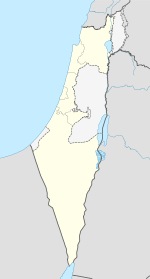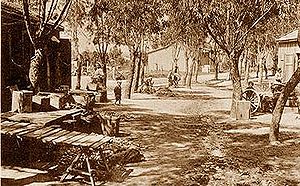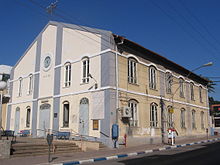- Petah Tikva
-
Petah Tikva Hebrew transcription(s) – Hebrew  פֶּתַח תִּקְוָה (help·info)
פֶּתַח תִּקְוָה (help·info)– Also spelled Petah Tiqwa (official)
Petach Tikvah (unofficial)
Emblem of Petah TikvaCoordinates: 32°05′19.78″N 34°53′10.8″E / 32.0888278°N 34.886333°ECoordinates: 32°05′19.78″N 34°53′10.8″E / 32.0888278°N 34.886333°E District Center Founded 1878 Government – Type City (from 1937) – Mayor Yitzhak Ohayon Area – Total 35,868 dunams (35.9 km2 / 13.8 sq mi) Population (2009)[1] – Total 209,600 Name meaning Opening of hope Petah Tikva (Hebrew: פֶּתַח תִּקְוָה, IPA: [ˈpetaħ tiqˈva], "Opening of Hope") known as Em HaMoshavot ("Mother of the Moshavot"), is a city in the Center District of Israel, 10.6 km (6.59 mi) east of Tel Aviv.
According to the Central Bureau of Statistics, at the end of 2009, the city's population stood at 209,600.[1] The population density is approximately 5,800 inhabitants per square kilometre (15,000 /sq mi). Petah Tikva's jurisdiction covers 35,868 dunams (~35.9 km² or 15 sq mi).
Etymology
The name of Petach Tikva was chosen by its founders in 1878 from the prophecy of Hosea (2:17), "And I will give her vineyards from thence, and the Valley of Achor for an opening of hope: and she shall sing there, as in the days of her youth, and as in the day when she came up out of the land of Egypt."
Petach Tikva's emblem appears on a postage stamp designed by Yitzhak Goldenhirsch, a founding member of Petah Tikva. The plow symbolizes Petach Tikva's origins as an agricultural settlement, the field symbolizes the drying of the Yarkon River swamps and cultivation of the land, and the orange tree symbolizes Petach Tikva's citrus industry, starting with the first tree planted by Rabbi Arye Leib Frumkin.
History
Petah Tikva was founded in 1878 by religious pioneers from Europe, who were led by Yehoshua Stampfer, Moshe Shmuel Raab, Yoel Moshe Salomon, Zerach Barnett, and David Gutmann, as well as Lithuanian Rabbi Aryeh Leib Frumkin.[2] It was the first modern Jewish agricultural settlement in Ottoman Palestine (hence its nickname as "Mother of the Moshavot") and has since grown to become one of Israel's most populous urban centres.
Originally intending to establish a new settlement in the Achor Valley, near Jericho, the pioneers purchased land in that area. However, Abdülhamid II cancelled the purchase and forbade them from settling there, but they retained the name Petah Tikva as a symbol of their aspirations.
Undaunted, the settlers purchased a modest area (3.40 square kilometers) from the village of Mulabbis (variants: Mlabbes, Um-Labbes), near the source of the Yarkon River. The Sultan allowed the enterprise to proceed, but because their purchase was located in what was a malarial swamp, they had to evacuate when the malaria spread, founding the town of Yehud near the Arabic village Yehudiyya about 20 kilometres (12 mi) to the south.[citation needed] With the financial help of Baron Edmond de Rothschild they were able to drain the swamps sufficiently to be able to move back in 1883, joined by immigrants of the First Aliyah, and later the Second Aliyah.
During the Sinai and Palestine Campaign of World War I, Petah Tikva served as a refugee town for residents of Tel Aviv and Jaffa, following their exile by the Ottoman authorities due to their refusal to serve the Ottoman army to fight the invading British forces. The town suffered heavily as it lay between the Ottoman and British fronts during the war.
Petah Tikva became the school for thousands of pioneer workers, who studied the craft of farming there before they ventured out to establish dozens of settlements in all parts of the country. The agricultural schools are still active to this day. Petah Tikva was also the birthplace of the Labor Zionist Movement, inspired and encouraged by the writings of A. D. Gordon who lived in the town.
The first recorded Arab attack on Jews in what would become Israel took place in Petah Tikva in 1886.[3] Petah Tikva was also the scene of Arab rioting in May 1921, which left four Jews dead.[4]
In the 1930s, the pioneering founders of Kibbutz Yavneh from the Religious Zionist movement immigrated to the British Mandate of Palestine, settling near Petah Tikva on land purchased by a Jewish-owned German company. Refining the agricultural skills they learned in Germany, these pioneers began in 1941 to build their kibbutz in its intended location in the south of Israel, operating from Petah Tikva as a base.
In the early 1920s, industry began to develop in the Petah Tikva region. In 1921, Petah Tikva was given the status of a local council by the British authorities, and in 1937 it was recognized as a city. Its first mayor, Shlomo Stampfer, was the son of one of its founders, Yehoshua Stampfer.
Urban development
After the creation of the State of Israel in 1948, several adjoining villages – Amishav and Ein Ganim to the east (named after the biblical village (Joshua 15:34)), Kiryat Matalon to the west, towards Bnei Brak, Kfar Ganim and Mahaneh Yehuda to the south and Kfar Avraham on the north – were merged into the municipal boundaries of Petah Tikva, giving it a significant population boost to 22,000.
Nowadays, with a population of over two hundred thousand inhabitants Petah Tikva is the third most populous city in the Tel Aviv Metropolitan Area ("Gush Dan").
Economy
Petah Tikva is the second-largest industrial sector in Israel after the northern city of Haifa. The industry is divided into three zones—Kiryat Aryeh (named after Aryeh Shenkar), Kiryat Matalon (named after Moshe Yitzhak Matalon), and Segula, and includes textiles, metalwork, carpentry, plastics, processed foods, tires and other rubber products, and soap.
Numerous high-tech companies and start-ups have moved into the industrial zones of Petah Tikva, which now house the Israeli headquarters for the Oracle Corporation, IBM, Intel, Alcatel-Lucent, ECI Telecom, and GlaxoSmithKline Pharmecuticals. The largest data center in Israel, operated by the company TripleC, is also located in Petah Tikva.[5] Furthermore, the Israeli Teva company, the world's largest generic drug manufacturer is headquartered in Petah Tikva, whilst one of Israel's leading food processing corporations, Osem opened in Petah Tikva in 1976 and has since been joined by the company's administrative offices, distribution center and sauce factory.
Over time, the extensive citrus groves that once ringed Petah Tikva have disappeared as real-estate developers acquired the land for construction projects. Many new neighborhoods are going up in and around Petah Tikva. A quarry for building stone is located east of Petah Tikva.
As well as general hi-tech firms, Petah Tikva has developed a position as a base for many communications firms. As such, the headquarters of the Bezeq International international phone company is located in the Kiryat Matalon industrial zone as are those of the 012 Smile Internet Service Provider. The headquarters of Tadiran Telecom are in the Ramat Siv industrial zone. Arutz Sheva, the right wing Religious Zionist Israeli media network operates an internet radio studio in Petah Tikva, where Arutz Sheva internet TV is located as well as the printing press for its B'Sheva newspaper.
The Israeli secret service, Shin Bet, has an interrogation facility in Petah Tikva.[6]
Transportation
Main article: Transportation in Petah TikvaPetah Tikva is served by a large number of buses. A large number of intercity Egged buses stop there, and the city has a network of local buses operated by the Kavim company. The Dan bus company operates lines to Ramat Gan, Bnei Brak and Tel Aviv.
Petah Tikva's largest bus terminal is the Petah Tikva Central Bus Station (Tahana Makazit), while other major stations are located near Beilinson Hospital and Beit Rivka. A rapid transit/light rail system is in the works which will connect Petah Tikva to Bnei Brak, Ramat Gan, Tel Aviv and Bat Yam.
Israel Railways maintains two suburban railroad stations in Segula and Kiryat Aryeh, in the northern part of the city. A central train station near the main bus station is envisioned as part of Israel Railways's long-term expansion plan. There are eight taxi fleets based in Petah Tikva, and the city is bordered by three of the major vehicle arteries in Israel: Geha Highway (Highway 4) on the west, the Trans-Samaria Highway (Highway 5) on the north, and the Trans-Israel Highway (Highway 6) on the east.
Santiago Calatrava's bridge, a 164 feet (50 m) long span Y-shaped cable-stayed pedestrian bridge connecting Rabin Hospital to a shopping mall, a residential development and a public park. The structure is supported from a 95-foot (29 m) high inclined steel pylon, which is situated where the three spans intersect. Light in construction, the bridge is built principally of steel with a glass-paved deck.[7]
Local government and politics
Petah Tikva's history of government goes back to 1880, when the pioneers elected a council of seven members to run the new colony. From 1880 to 1921, members of the council were David Meir Guttman, Yehoshua Stampfer, Ze'ev Wolf Branda, Abraham Ze'ev Lipkis, Yitzhak Goldenhirsch, Chaim Cohen-Rice, Moshe Gissin, Shlomo Zalman Gissin and Akiva Librecht. This governing body was declared a local council in 1921, and Petah Tikva became a city in 1937. Kadima, the political party founded by former Israeli prime minister Ariel Sharon and now headed by Tzipi Livni, has its headquarters in Petah Tikva.[8] In 2007, the discovery of a group of Neo-Nazi teenagers, Patrol 35, formed by immigrants from the former Soviet Union with some Jewish ancestry shocked the country.[9]
Council heads
- Shlomo Zalman Gissin (1921)
- Pinchas Meiri (1922–1928)[10]
- Shlomo Stampfer (1928–1937)
Mayors
- Shlomo Stampfer (1938–1940)
- Yosef Sapir (1940–1950)
- Mordechai Kraufman (1951)
- Pinchas Rashish (1951–1966)
- Yisrael Feinberg (1966–1978)
- Dov Tavori (1978–1989)
- Giora Lev (1989–1999)
- Yitzhak Ohayon (1999–present)
Schools and religious institutions
Petah Tikva is home to 300 educational institutions from kindergarten through high school, catering to the secular, religious and Haredi populations. There are over 43,000 students enrolled in these schools, which are staffed by some 2,400 teachers. In 2006, five schools participated in the nationwide Mofet program, which promotes academic excellence.[citation needed] Petah Tikva has nine public libraries, the main one located in the city hall building.
Some 70,000 Orthodox Jews live in Petah Tikva. The community of Petah Tikva is served by 300 synagogues,[11] including the 120-year old Great Synagogue,[12] eight mikvaot (ritual baths)[13] and two major Haredi yeshivot, Lomzhe Yeshiva and Or-Yisrael (founded by the Chazon Ish, Rabbi Avraham Yeshayahu Karelitz). Yeshivat Hesder Petah Tikva, a modern-orthodox Hesder Yeshiva affiliated with the Religious Zionist movement, directed by Rabbi Yuval Cherlow, is also located in Petah Tikva.
Petah Tikva has two cemeteries: Segula Cemetery, east of the city, and Yarkon Cemetery, to the northeast.
Neighborhoods
Main article: List of neighborhoods of Petah TikvaPetah Tikva is divided into 33 neighborhoods for municipal purposes:[14]
Health care
Petah Tikva has the most extensive health coverage of any city in Israel relative to the size of its population.[citation needed] Six hospitals are located in the city. The Rabin Medical Center Beilinson complex includes the Beilinson Medical Center, the Davidoff Oncologic Center, the Geha Psychiatric Hospital, the Schneider Pediatric Hospital and Tel Aviv University's Faculty of Medical Research. Other medical facilities in Petah Tikva are HaSharon Hospital, the Beit Rivka Geriatric Center, the Kupat Holim Medical Research Center and a private hospital, Ramat Marpeh, affiliated with Assuta Hospital. The Schneider Pediatric Center is one of the largest and most modern children's hospitals in the Middle East. In addition, there are many family health clinics in Petah Tikva as well as Kupat Holim clinics operated by Israel's Health maintenance organizations.
Landmarks and cultural institutions
- Beit Yad Labanim
- Petah Tikva Museum of Art
- Petah Tikva Zoo
- Rothschild Arch
Arab-Israeli conflict
During the Second Intifada, Petah Tikva suffered three terrorist attacks: On May 27, 2002, a suicide bomber blew himself up at a small cafe outside a shopping mall, leaving two dead, including a baby;[15] on December 25, 2003, a suicide bomber blew himself up at a bus stop near the Geha bridge, killing 4 civilians, and on February 5, 2006, a Palestinian got into a shuttle taxi, pulled out a knife, and began stabbing passengers killing two of them, but a worker from a nearby factory hit him with a log, subduing him.
Sports
Petah Tikva has two soccer teams – Hapoel Petah Tikva F.C. and Maccabi Petah Tikva F.C.. The local baseball team, the Petach Tikva Pioneers, played in the inaugural 2007 season of the Israel Baseball League. The league folded the following year.
Notable residents
- Yehuda Amichai (1924–2000), poet
- Hanoch Bartov (b. 1926 in Petah Tikva), author and columnist
- Tal Burstein (b. 1980 in Petah Tikva), professional basketball player
- Shmuel Dayan (1891–1968), Zionist activist
- Israel Finkelstein (b. 1949 Petah Tikva), archaeologist
- Dudu Fisher (b. 1951 in Petah Tikva), cantor and stage performer
- Yehoshua Kenaz (b. 1937 in Petah Tikva), novelist
- A. D. Gordon (1856–1922), Labor Zionist ideologue
- Tamar Gozansky (b. 1940 in Petah Tikva), politician
- Avraham Grant (b. 1955 in Petah Tikva), former coach of Israel national football team and Chelsea F.C.
- Tzofit Grant (b. 1964 in Petah Tikva), television personality and Avraham Grant's wife
- Simcha Jacobovici (b. 1953 in Petah Tikva), filmmaker
- Haim Kaufman (b. 1936 in Petah Tikva), city council member, Knesset member, deputy to finance minister, businessman
- Itzik Kol (1932–2007), television and movie producer
- Samir Naqqash (1938–2004), Iraqi-Jewish author
- Zvi Nishri (Orloff) (1878–1973), Russian/Palestinian/Israeli pioneer in physical education
- Elyakum Ostashinski (b. 1909 in Petah Tikva), first mayor of Rishon LeZion
- Leah Rabin (1928–2000), wife of assassinated Israeli prime minister Yitzhak Rabin, lived in Petah Tikva from 1995 until her death in 2000
- Neta Rivkin (born 1991), rhythmic gymnast
- Pnina Rosenblum (b. 1954 in Petah Tikva), fashion model, businesswoman, and politician.
- Rami Saari (b. 1963 in Petah Tikva), poet, translator, linguist, and literary critic
- Dan Shechtman (b. 1941), winner of Nobel Prize for Chemistry[16]
- Giora Spiegel (b. 1947 in Petah Tikva), soccer player and coach
- Nahum Stelmach (1936–99), soccer player and figurehead of local team, Hapoel Petah Tikva
- Idan Tal (b. 1975 in Petah Tikva), soccer player
International relations
Twin towns — Sister cities
Petah Tikva is twinned with:
 Chicago, Illinois, United States
Chicago, Illinois, United States Laval, Quebec, Canada
Laval, Quebec, Canada Koblenz, Germany
Koblenz, Germany Odense municipality, Denmark
Odense municipality, Denmark
References
- ^ a b "Table 3 – Population of Localities Numbering Above 2,000 Residents and Other Rural Population". Israel Central Bureau of Statistics. June 30, 2010. http://www.cbs.gov.il/population/new_2010/table3.pdf. Retrieved October 30, 2010.
- ^ "Rishonim.org.il". Rishonim.org.il. http://www.rishonim.org.il/petach-tikva/info/founder_show.aspx?id=51. Retrieved September 16, 2011.
- ^ "Frumkin News – Newsletter No. 34". September 2002. http://www.frumkin.org.il/newsl02.htm. Retrieved October 21, 2008.
- ^ "Petah Tikvah". Jewish Agency for Israel. http://www.jafi.org.il/education/100/PLACES/pt.html. Retrieved October 21, 2008.
- ^ Thecom.co.il (Hebrew)
- ^ "Kept in the Dark, Oct. 2010 | B'Tselem". Btselem.org. http://www.btselem.org/english/publications/summaries/201010_kept_in_the_dark.asp:. Retrieved September 15, 2011.
- ^ "Calatrava in Israel". WorldArchitecturenews.com.
- ^ Hoffman, Gil (September 20, 2007). "Olmert Moves to Keep Kadima United". The Jerusalem Post. http://fr.jpost.com/servlet/Satellite?cid=1189411442925&pagename=JPost/JPArticle/ShowFull. Retrieved October 21, 2008.
- ^ "Israeli 'neo-Nazi gang' arrested". BBC. September 9, 2007. http://news.bbc.co.uk/2/hi/middle_east/6985808.stm.
- ^ "Muni.tik-tak.co.il". Muni.tik-tak.co.il. http://muni.tik-tak.co.il/WEBPRO/project/katava1.asp?codeClient=902&CodeSubWeb=0&id=26586&projId=3673. Retrieved September 16, 2011.
- ^ "Places to Live – Petah Tikvah". Tehilla – Pilot Trips. http://www.tehilla.com/aliya/places.asp?id=60. Retrieved October 21, 2008.
- ^ Stoil, Rebecca Anna (May 4, 2006). "Petah Tikva Synagogue Desecrated". The Jerusalem Post, cited in Pogrom.co.il. http://pogrom.org.il/eng_articles.php?art_id=21. Retrieved October 21, 2008.
- ^ "List of Mikvaot in the City". Petah Tikva municipality. http://www.petah-tikva.muni.il/htmls/hebrew/dat_mikveot.asp. Retrieved October 21, 2008.
- ^ "Connect to the Neighborhood". Petah Tikva municipality. http://www.petah-tikva.muni.il/Openning_maps.asp. Retrieved July 19, 2008.
- ^ "MFA.gov.il". MFA.gov.il. http://www.mfa.gov.il/MFA/Facts+About+Israel/Israel+in+Maps/2000-2004-+Major+Terror+Attacks.htm. Retrieved September 16, 2011.
- ^ Clear as crystal, Haaretz
- ^ "Trondheims offisielle nettsted – Vennskapsbyer" (in (Norwegian)). Trondheim.com. http://www.trondheim.com/content.ap?thisId=93081934. Retrieved September 16, 2011.
External links
- Official website (English)
- Photos of Petah Tikva
Center District of Israel Cities El'ad · Hod HaSharon · Kafr Qasim · Kfar Saba · Lod · Modi'in-Maccabim-Re'ut · Ness Ziona · Netanya · Petah Tikva · Qalansawe · Ra'anana · Ramla · Rehovot · Rishon LeZion · Rosh HaAyin · Tayibe · Tira · Yavne · Yehud-Monosson
Local councils Be'er Ya'akov · Beit Dagan · Bnei Ayish · Elyakhin · Even Yehuda · Gan Yavne · Ganei Tikva · Gedera · Jaljulia · Kafr Bara · Kfar Yona · Kiryat Ekron · Kokhav Ya'ir · Mazkeret Batya · Pardesiya · Savyon · Shoham · Tel Mond · Tzoran-Kadima · ZemerRegional councils Brenner · Gan Raveh · Gederot · Gezer · Drom HaSharon · Hefer Valley · Hevel Modi'in · Hevel Yavne · Hof HaSharon · Lev HaSharon · Lod Valley · Nahal SorekBoroughs See also Other sub-divisions: Haifa District · Jerusalem District · Judea and Samaria Area · North District · South District · Tel Aviv DistrictIsraeli cities with a 50,000+ population 500,000+ 200,000 – 499,999 100,000 – 199,999 50,000 – 99,999 Herzliya • Kfar Saba • Ra'anana • Hadera • Beit Shemesh • Modi'in-Maccabim-Re'ut • Lod • Nazareth • Ramla • Giv'atayim • Rahat • Nahariya • Kiryat AtaCategories:- Center District (Israel)
- Petah Tikva
- Populated places established in 1878
- Jewish villages in the Ottoman Empire
Wikimedia Foundation. 2010.













